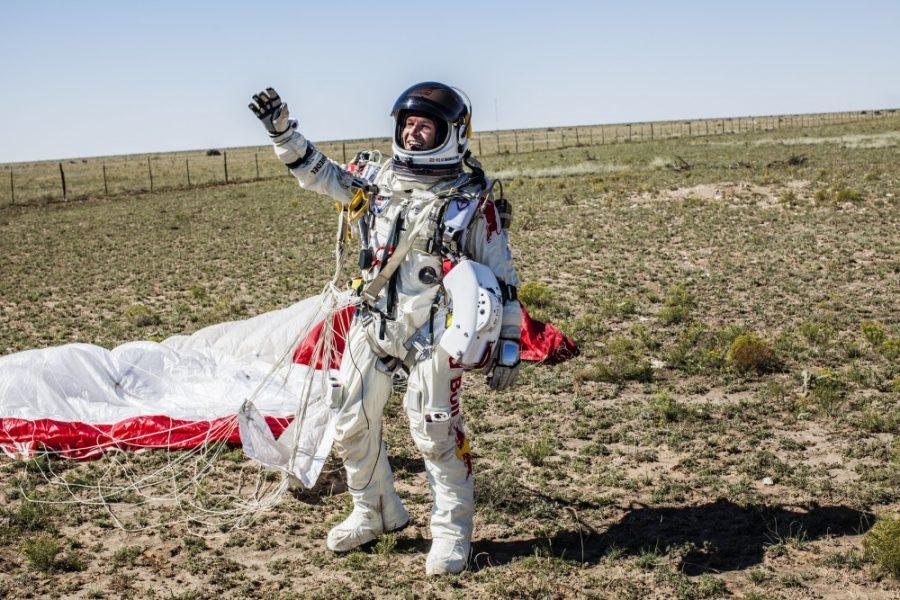LOS ANGELES – With a short salute and a small step forward, Felix Baumgartner leapt from a capsule perched more than 24 miles above a barren New Mexico desert and landed safely, setting a world record for the highest sky dive.
“Sometimes you have to go up really high to understand how small you are,” Baumgartner said before stepping off a small ledge on the outside of a capsule lifted into the stratosphere by a helium-filled balloon. “I’m going home now.”
Baumgartner, 43, hit speeds of nearly 834 mph, becoming the first free-falling human to crack the sound barrier. He also set a record for the highest altitude manned balloon flight at 128,100 feet above the Earth – about one mile higher than expected.
The event also scored a record for social media.
The mission had more than two-dozen cameras, including a helmet cam, to catch the action on the way up and the jump itself. It was webcast live on the event website and on YouTube. More than 8 million computers and other digital devices were tuned in to the live stream on YouTube alone, making the jump the most-watched live event ever on the site.
There were a couple of dicey moments.
While Baumgartner was ascending, he told mission control about a “serious” issue with the heat in his visor faceplate. He couldn’t feel warmth on his face, and the visor was fogging up. But officials gave Baumgartner the go-ahead for the jump.
He popped open the capsule door and sunlight streamed in. It was a sight that Baumgartner had not seen in the 2 and a half hours he spent alone climbing toward aerospace history.
Not long after he stepped into the stratosphere, Baumgartner began wildly spinning as he descended at high speeds. Officials had feared a so-called “flat spin” – a horizontal spin that can lead to a loss of consciousness.
The spinning was apparent even in a live video shot taken by a long-range camera. But Baumgartner righted himself.
“We were glad he was able to get it under control,” said Art Thompson, technical project director for the mission. “He went into a tumble.”
Before the feat, there had been concerns about how a human body might respond to supersonic speeds without benefit of aircraft. But at a post-event news conference, Baumgartner said he didn’t know when he sped through the sound barrier. “I didn’t feel it at all,” he said.
After free falling 119,846 feet, Baumgartner pulled the rip cord and sent his red and white parachute streaming into the sky. Slowly, he floated to the ground about 35 miles east of where the balloon first launched. In all, the decent lasted about 10 minutes.
Upon landing, he fell to his knees and raised his fists before being enveloped by personnel involved in the mission.
Congratulations came in via Twitter from a wide range of onlookers, including the Air Force, NASA and other aerospace entities.
The jump was an endeavor, five years in the making, to break a free-fall world record of 102,800 feet, or 19 miles, set by Air Force test pilot Joe Kittinger in 1960. Kittinger, now 84, was part of the new mission and relayed messages between the control room and Baumgartner.
“A better champion cannot be found than Felix Baumgartner,” Kittinger said at the news conference.
There was one record Baumgartner didn’t break. His free fall was 4 minutes, 20 seconds, but Kittinger’s lasted for 4 minutes, 36 seconds.
Baumgartner’s supersonic jump came 65 years to the day after test pilot Chuck Yeager became the first man to break the sound barrier when he flew the Bell X-1 above Edwards Air Force Base in California on Oct. 14, 1947.
The jump, twice delayed last week by wind gusts, was designed to test the threshold of his equipment and to explore the limits and capabilities of a human body bailing out from an aircraft at extremely high altitudes above the Earth.
It was funded by energy drink company Red Bull, which paid millions of dollars to Southern California aerospace companies to pull off the stunt, but wouldn’t say how much. The event was named Red Bull Stratos.
Most of the equipment involved was built by Sage Cheshire Inc., a small aerospace firm in Lancaster, Calif..
The pressurized capsule, weighing 2,900 pounds – a little more than a Volkswagen Beetle – was carried by the largest balloon ever used in a manned flight to altitude – 55 stories tall. Temperatures outside the capsule fell lower than minus 80 degrees.
Baumgartner, an Austrian national who lives in Switzerland, is an accomplished jumper who has parachuted from a variety of structures, including the Jesus statue in Rio de Janeiro and one of the world’s tallest buildings, Taipei 101 Tower in Taipei, Taiwan. He said the Stratos mission was taxing.
“There’s a reason that nobody was able to break Joe Kittinger’s record for 52 years,” Baumgartner said. “It’s a difficult task.”









